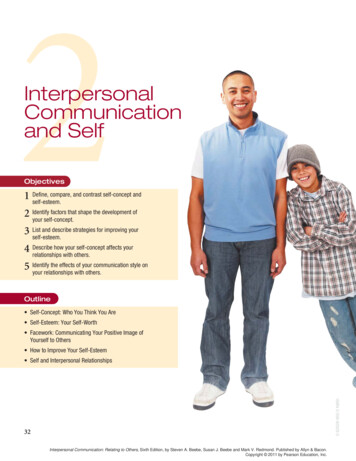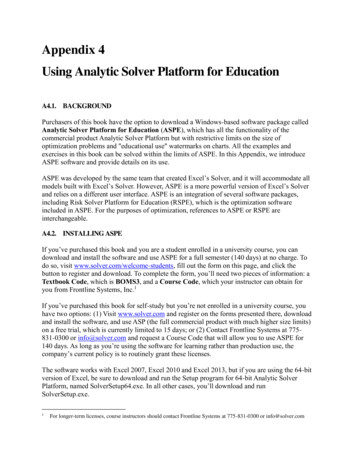
Transcription
Appendix CInterpersonal InventorySample Closeness Circle for icaLaura J. Dietz, Rebecca J. Weinberg, Laura MufsonFamily-based Interpersonal Psychotherapy for Depressed Preadolescents. 2018 by Oxford University PressOxford Clinical Psychology Oxford University PressMom
Questions to Guide the Interpersonal InventoryThe goal of the interpersonal inventory is to get a detailed picture ofthe preadolescent’s significant relationships in order to identify patternsabout communication and problem- solving that may be negativelyimpacting on the preadolescent’s mood. The questions typically startout more general and gradually become more specific to elicit detailsabout specific types of interactions, problems within the relationship,and desired changes for the relationship.Questions about Events Related to the Interpersonal Problem Areas:Has anything happened recently that you think has made you feelmore sad?Have there been any big or small changes in your life in the past year ormore? New school? New home? Different friends? Changes with yourparents?Have you been having trouble getting along with people? Getting intofights or arguments? About what? With friends and/ or family? At homeor in school?Have you been having trouble making friends in school? In theneighborhood?Has anyone you have been close to died recently or died a while ago butyou still think about that person a lot?Types of Questions to Ask about Each Relationship:Tell me a little about ? What do you like about ? What don’t you like about ?How much time do you spend together? What kinds of things do youdo together?Laura J. Dietz, Rebecca J. Weinberg, Laura MufsonFamily-based Interpersonal Psychotherapy for Depressed Preadolescents. 2018 by Oxford University PressOxford Clinical Psychology Oxford University Press
Do you like to talk to about what is going on in your life?What kinds of things can you talk about with ?Are there things you feel you can’t talk about with ?How come?How do you feel when you and are together?Happy? Sad?What do you do together with that makes youfeel happy?What happens when you are together with thatmakes you feel sad?Do you get into arguments with a lot?What happens when you argue or fight with ?Do you get the chance to solve the conflict with , ordo you just drop it because you are so angry with each other?Does know that you have been feeling sad? If yes, howdoes he/ she talk to you about it? If no, would you like him/ her to know?Is there anything you would like to change about your relationship with?Additional Questions for Exploring Grief as a Problem Area:Can you tell me about your relationship with ? Howlong ago did he/ she die?How did you find out about it? Have you been able to talk to anyoneabout your feelings? Now or when it happened?How much time did you spend with ? Did you speakto him/ her a lot? Was this someone who you could tell your feelings to?How has it been to be without this person? What do you miss abouthim/ her?Laura J. Dietz, Rebecca J. Weinberg, Laura MufsonFamily-based Interpersonal Psychotherapy for Depressed Preadolescents. 2018 by Oxford University PressOxford Clinical Psychology Oxford University Press
When you think about him/ her, how do you feel? Has this loss causedchanges in your other relationships?Additional Questions for Exploring Interpersonal Role Disputes as aProblem Area:What happens when you try to talk to about yourfeelings or when you want something?How often do you disagree or fight with ? Whathappens?Have you ever tried to talk to about how that makesyou feel? What happened when you tried?What stops you from talking to about your feelings?What about this person makes you so angry?Have you ever tried to come up with a solution to your disagreements with? What happened?When you disagree with about something, have youever been able to come to a new agreement?Additional Questions for Exploring Role Transitions as a Problem Area:Have there been changes in your life lately? At home? At school?What feels different to you?What is okay about the changes? What feels hard to you about thechanges?Anything you like about the change?Has the change made you worry about things? Like what?Anything about the changes that has made you feel sad?Laura J. Dietz, Rebecca J. Weinberg, Laura MufsonFamily-based Interpersonal Psychotherapy for Depressed Preadolescents. 2018 by Oxford University PressOxford Clinical Psychology Oxford University Press
Have you been able to talk to anyone about what feels bad about thechanges? What stops you from talking to someone?Additional Questions for Exploring Interpersonal Deficits as a Problem Area:Would you say it is hard for you to make friends? What is hard about it?Do you feel lonely or uncomfortable in some social situations? Whichones? How so?How do you feel when you are in a new situation like when you are putinto a new group at school? Is that hard for you?How do you feel when you are with groups of kids your age? Do you feellike part of the group or more like an outsider?Do you ever feel like other kids pick on you?Are there friends who you feel close to and who you can talk to?How is it for you to try to make new friends? Do you wait for someoneto come to you and be friendly or can you go up to someone new?What do you think would help you to feel more comfortable withpeople?Laura J. Dietz, Rebecca J. Weinberg, Laura MufsonFamily-based Interpersonal Psychotherapy for Depressed Preadolescents. 2018 by Oxford University PressOxford Clinical Psychology Oxford University Press
Questions to Guide the Interpersonal Inventory. The goal of the interpersonal inventory is to get a detailed picture of the preadolescent’s significant relationships in order to identify patterns . about communication and problem-solving that may be negatively impacting on











